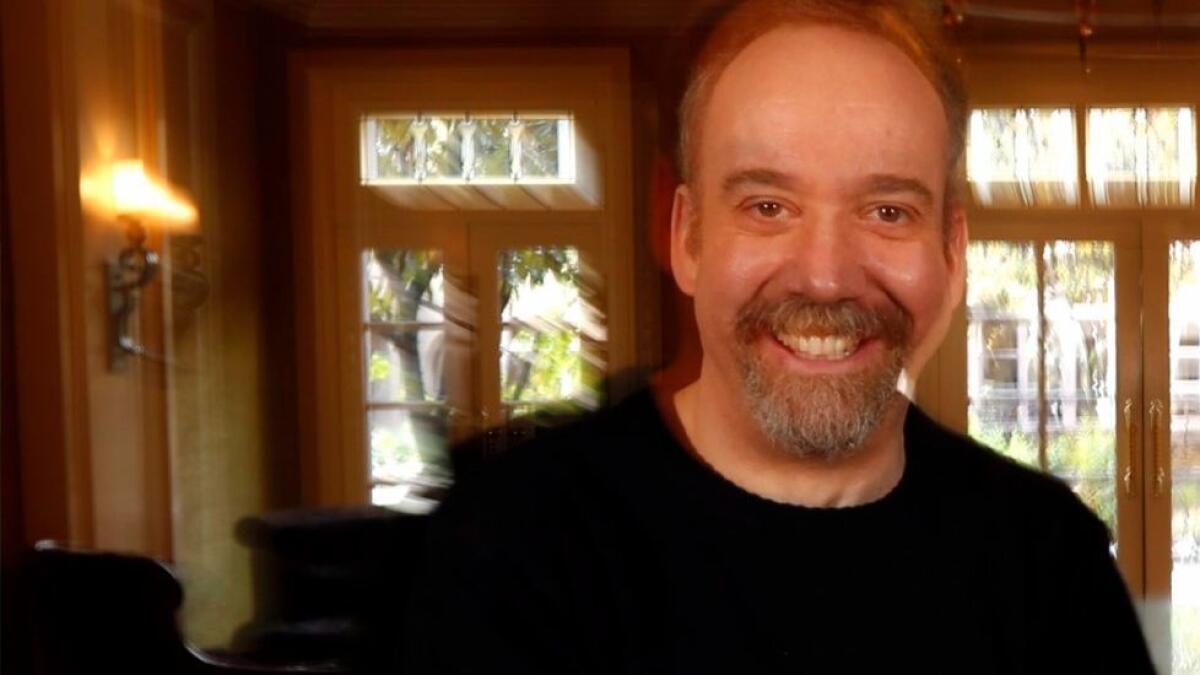Paul Giamatti explores male power and the clash of egos in ‘Billions’

Reporting from New York City — Paul Giamatti has spent two decades bringing his flawed-everyman charm to diverse roles: frustrated writer, Founding Father, even God. For two seasons, in Showtime’s “Billions,” he has brought it to Chuck Rhoades, a U.S. attorney locked in an alpha-dog struggle with hedge-fund billionaire Bobby Axelrod (Damian Lewis).
In Giamatti’s first ongoing TV role (no one had ever offered him one before, he says), Chuck has a complex relationship with power — as well as with his wife, Wendy (Maggie Siff). Serenely sipping water in a quiet Brooklyn bistro, Giamatti says he enjoys exploring Chuck’s “nooks and crannies and layers” and carefully reveals a few of his own.
Has playing Chuck Rhoades allowed you to explore anything new?
I don’t usually play strong people. He’s insecure and weak in some ways, but he tells people what to do and they do it. I generally play people who tell people what to do and they don’t do it, and they’re frustrated that nobody will do what they tell them to.
Do you think about the show’s bigger themes?
I suppose I do. It’s about male power. I think about how a scene will express the larger idea of a guy who can’t control his male ego.
Power and control are also elements of Chuck and Wendy’s relationship.
You mean the violent sex stuff. What I like is it’s just a thing they do. He’s tied to the bed, and then they have ice cream. Maggie and I met a couple, and it was amazing just how normal and in the course of events the crazy stuff these people did was.
How did you and Maggie prepare for those scenes?
We had a technical adviser, a dominatrix, and met some of her clients. But ultimately we just had to do it. It helps to be with somebody that’s cool. You’re not going to worry about the other person being freaked out or too into it.
Chuck is partly based on former U.S. Attorney for the Southern District of New York Preet Bharara. Donald Trump famously fired him in March. Will that factor into the story line?
I don’t know. The show is rooted enough in the real world that it has to acknowledge, not the things that literally happened, but that the structures of things are changing. It’s a different world.
Have you helped shape your character?
Things happen as we’re shooting, like the way my character chows down on food. I hate when actors don’t eat in movies because they’ll end up eating an enormous amount; you have to do a scene over and over. So I was, like, ‘I’m going to really chow!’ They’re, like, ‘That’s awesome the way you’re taking food from other people.’ That became part of my character. There’s a thing with Winston Churchill books. I have an interest in Churchill, so they threw that in there.
Do you ever root for Damian Lewis’ character instead of yours?
No. I think those guys should go to jail. I don’t have anything against [hedge-fund] guys, but the crooked ones I find reprehensible. It seems like a victimless crime, there’s no body in the street, but they can mess up people’s lives.
You’ve done movies, TV, theater, producing. What goals do you still have?
I just want to keep acting until I can’t do it anymore.
Well, you’re a guy, so there’s no expiration date.
A guy who can get bald. So, yeah, I can get old. I‘d like to do more theater. I like acting with my whole body, which you don’t really do on film. You’re acting with your head. You can feel disembodied.
How do you feel about fame?
I was naive about it coming with the territory. Or maybe I didn’t think I would be in the position where anybody would care that much. I think I thought, well, I’ll do stuff I like and get good work and I won’t have to deal with this other stuff. But if you get good work you have to deal with that stuff.
You may have it especially hard because everyone feels like you’re their best friend.
You may be right. I worked with a director who had worked with Danny DeVito and he said, ‘You guys elicit the same thing. People just want to sit down and chat with you.’ The thing that’s a drag is it takes away your anonymity and your ability to watch people. Eventually, I realized I just have to do it while they come up and talk to me. It’s an opportunity for me to get even closer to people.
See the most read stories this hour »
More to Read
From the Oscars to the Emmys.
Get the Envelope newsletter for exclusive awards season coverage, behind-the-scenes stories from the Envelope podcast and columnist Glenn Whipp’s must-read analysis.
You may occasionally receive promotional content from the Los Angeles Times.






